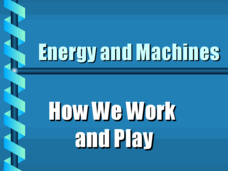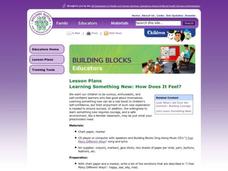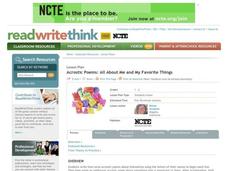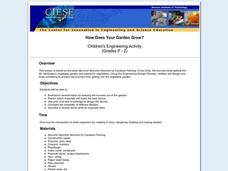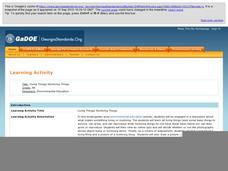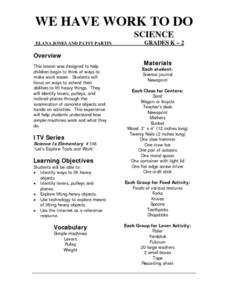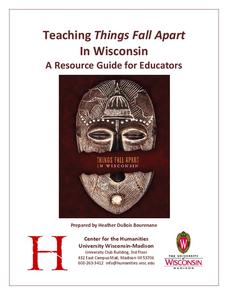Curated OER
Energy and Machines: How We Work and Play
Energy and machines are two things that belong together. This resource provides a clear and simple overview of energy, force, work, and machines. Because the information in this presentation is clear and well-organized it would...
Pace University
Grade 6-8 Living Things
What characterizes a living thing? Scholars explore the concept during a differentiated instruction unit on living things. They perform lab experiments to determine how animals adapt to stimuli, watch videos and learn about...
Curated OER
Refrigeration Part 2 - How they work
Fourth graders investigate insulators and how refrigerators actually work to keep things cold through evaporation and pressure changes in the coolant. They create a box to keep an ice cube from melting, and observe a variety of...
Curated OER
Things Fall Apart: Bloom's Taxonomy of Thinking Processes
One of the things that makes Bloom's Taxonomy so effective is that it works off different levels of understanding. Test your readers' knowledge, comprehension, application, analysis, synthesis, and evaluation with these short questions....
American Museum of Natural History
Optical Illusions and How They Work
Illusions are what your mind makes them. Learners view several optical illusions. After each illusion the resource describes what is seen and the potential connection to evolution of the brain. Illusions include seeing different objects...
Curated OER
Electricity - How it Works and How We Measure and Pay For It
Students investigate energy consumption by researching wattage. In this electricity lesson, students discuss how electricity works and gets transferred to our electronic devices through generators and circuits. Students examine their...
Science 4 Inquiry
Investigating How Heat Flows
It is impossible to cool down a glass of water by adding ice. Young scientists explore heat transfer through videos, experiments, and interactive games. They quickly catch on that the water melts the ice and things aren't always as they...
Smarter Balanced
How the Brain Works
Cerebrum, cerebellum, brainstem, pituitary gland, and spinal cord. Prepare your class for a performance task assessment on the brain and how it works with a scripted plan that defines these terms and identifies the functions the parts...
Science Matters
Basic Needs
Scholars take part in a grand conversation about the basic needs of living things. Working collaboratively, pupils brainstorm and identify similarities to come to the conclusion that the environment meets the needs of all living things.
Film English
5 Things Every Presenter Needs To Know
Prepare your pupils for making excellent presentations. Class members discuss elements of a successful presentation, work in groups to come up with their own scripts for the featured video, compare their work to the original voice-over,...
Curated OER
Connect the Spheres: Earth Systems Interactions
Is everything really connected? Take your class on a walk outside, where they will make observations and write them down on a worksheet. Once they are back in the classroom, learners will work to determine if and how things like birds,...
Carolina K-12
Are You a Democrat or a Republican? Are You Really?
Have new or soon-to-be voters examine different political parties and their platforms as they figure out which one aligns most with their beliefs. After taking a few online quizzes, students split into pairs to discuss and then in larger...
National Endowment for the Humanities
Chinua Achebe's Things Fall Apart: Oral and Literary Strategies
Readers are first introduced to Chinua Achebe's Things Fall Apart by making a map of Africa. They will better understand the novel's historical and literary contexts, European and African literary traditions, and how historical events...
US Department of Health and Human Services
Learning Something New: How Does It Feel?
Use song and dance to help your youngsters identify their feelings and embrace learning. Starting with a brainstorming activity, class members talk about learning new things and how this made them feel. After listing to the song, and...
National Council of Teachers of English
Acrostic Poems: All About Me and My Favorite Things
Budding poets create two acrostic poems, one for their name and another using a word of their choice. Over the course of five days, scholars compose, revise, publish, and share their work with their peers.
Steven's Institute of Technology
How Does Your Garden Grow?
What to do, bunnies are getting into the garden and eating all the carrots! After reading the story Muncha! Muncha! Muncha! the class works together to design a device that will keep those bunnies out of the garden. They get together in...
US National Archives
The Home Front: How Did People Prepare for the War at Home?
Wars have a profound effect not only on a country's soldiers, but also on the everyday lives of its citizens. Invite young historians to discover how Britain prepared for the second World War by analyzing a series of government posters...
Captain Planet Foundation
Rotting Away
What happens at the end of a plant's life cycle? Show kids the natural way that plants show that they're decomposing, as well as the importance of compost, with a lesson about living organisms. After reading Log Cabin by Anne Schreiber,...
Colorado State University
How Can I Turn a Solar Oven into a Refrigerator?
Whether you want to heat things up in science class or cool things down a bit, an intriguing lab's got you covered! Science scholars explore the principles of thermodynamics using a solar oven, then change the conditions to turn their...
Nebraska Department of Education
The Five Things
High school freshmen consider how their resources and values can support them in their future goals by answering questions such as; What do you value? What do you enjoy doing? What do you do well? Of what accomplishments are you...
Georgia Department of Education
Living Things/ Nonliving Things
How can you tell if something is living or nonliving? Introduce a set of criteria which can be used to determine which things are alive and which are not. The class discusses the basic needs of all living organisms, checks out an...
Curated OER
We Have Work to Do!
An excellent lesson awaits your young scientists! In it, learners are invited to explore the world of pulleys, levers, and planes; simple machines that make lifting heavy things much, much easier. They watch video, and engage in hands-on...
University of Wisconsin
Teaching Things Fall Apart in Wisconsin: A Resource Guide for Educators
“There is no story that is not true, . . .” And uncovering the truths in Things Fall Apart is the focus of a 68-page resource packet designed to provide instructors with a wealth of materials that enhance understanding of Chinua Achebe’s...
NASA
Things Are Not Always What They Seem
Science is magic that works. Magical color-changing beads and a coffee can that follows voice commands are just two examples of magic tricks that rely on science. After completing a hands-on activity and an experiment investigating the...
Other popular searches
- How Things Work Lenses
- How Things Work Toaster
- Explaining How Things Work
- How Things Work" Odometer
- Explanation How Do Things Work
- How Things Work Odometer
- "How Things Work" Odometer


